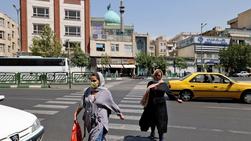 Iranian women cross a street in downtown Tehran, Iran, on July 20, 2021, amid restrictions imposed to curb the spread of COVID-19. (ATTA KENARE / AFP)
Iranian women cross a street in downtown Tehran, Iran, on July 20, 2021, amid restrictions imposed to curb the spread of COVID-19. (ATTA KENARE / AFP)
WELLINGTON / SINGAPORE / TEHRAN / JERUSALEM / ANKARA / SEOUL / RIYADH / YANGON / NEW DELHI / MANILA / KUALA LUMPUR / VIENTIANE / ULAN BATOR / BANGKOK / TEHRAN - Iran's overall COVID-19 death toll reached 100,255 on Thursday after registering an overnight 564 new death cases, according to Iran's Ministry of Health and Medical Education.
Also, 31,266 new COVID-19 cases were reported, taking the country's total infections to 4,587,683.
A total of 3,840,568 people have recovered from the disease or been discharged from hospitals across the country, while 7,538 remain in intensive care units, the ministry said.
On Monday, Iran started a six-day lockdown of all non-essential businesses across the country amid the resurgence of the Delta variant of the disease
By Thursday, 16,254,282 people have received at least a dose of a coronavirus vaccine in the country, while 5,236,423 have taken two doses.
The reasons for the sheer increase in infection rates since the end of June, health officials say, are the higher contagiousness of the Delta variant of the coronavirus currently spreading in Iran, and a decline in people's awareness of observing health recommendations.
On Monday, Iran started a six-day lockdown of all non-essential businesses across the country amid the resurgence of the Delta variant of the disease.
Iran reported the first cases of COVID-19 in February 2020.
Sri Lanka
Sri Lanka's Health Ministry on Thursday said the number of people above the age of 30 who had received both doses of the COVID-19 vaccines had exceeded the 5-million mark while over 12 million had been administered the first doses.
According to official statistics, 5,124,185 persons had obtained two doses of the vaccine.
The total number of vaccines that have been administered, including the first and second doses adds up to 17,143,378.
The leading vaccines being administered across the country are the Sinopharm doses which arrived from China, with 9,521,900 first doses administered and 4,167,616 second doses administered till Wednesday.
The other vaccines being administered are AstraZeneca, Pfizer, Sputnik V and the Moderna vaccines.
Oman
Oman will ease a curfew imposed to combat the spread of COVID-19 by reopening public buildings, malls and restaurants and resuming public events, authorities said on Thursday.
Shops have been closed and commercial activities shuttered between 8:00 pm and 4:00 am since May.
They will reopen on Saturday but then be restricted again between those hours from Sept 1 to people who have been doubly vaccinated against the virus, a government committee tasked with coordinating efforts against the pandemic said on Twitter.
The committee did not give an explanation for the two-stage process.
Vaccination is also being introduce as a condition for visitors entering Oman, on top of an existing a seven-day quarantine requirement, it added.
COVID-19 infections are decreasing in Oman, with 187 reported per day on average over the past week, according to the Reuters COVID tracker. There have been 300,728 in all, and 4,013 coronavirus-related deaths.
Indonesia
The World Health Organization has urged Indonesia to take action to stem transmission of the coronavirus, following new data showing that mobility for retail and recreation has reached pre-pandemic levels in some key regions.
Indonesia, which last month became the epicentre of Asia's coronavirus outbreak, has social mobility restrictions in place, that currently allow malls and restaurants in designated areas to operate at 25 percent of capacity.
The WHO's latest situation report highlighted "a notable increase in community mobility in retail and recreation" in the provinces of Banten, West Java and Central Java, collectively home to about 97 million people.
Retail and recreation spaces refers to restaurants, cafes, shopping malls, libraries, museums and theme parks.
Based on Google data from the second week of August, the WHO said mobility reached levels not seen since February 2020.
"Formulation of a concrete plan and urgent action are crucial to anticipate and mitigate the impact of increased mobility on transmission and health system capacity," the report said.
Driven by the highly infectious Delta variant, daily coronavirus cases in Indonesia hit more than 56,000 last month, with hospitals on the most populous island of Java short on beds and oxygen and inundated with patients.
Daily cases have dropped significantly to about 15,000 on Aug 18, but testing rates have also fallen and the positivity rate and death toll have remained stubbornly high.
Australia
Australia has suffered its worst day since the start of the COVID-19 pandemic, with total daily cases surpassing the previous record posted more than a year ago as an outbreak of delta variant cases spreads.
New South Wales recorded 681 new cases, Premier Gladys Berejiklian told reporters on Thursday in Sydney, where stay-at-home orders have been enforced for almost two months.
Victoria state recorded 57 new infections - more than double from the previous day, and its highest tally since September - as Melbourne endures its sixth lockdown since the pandemic began.
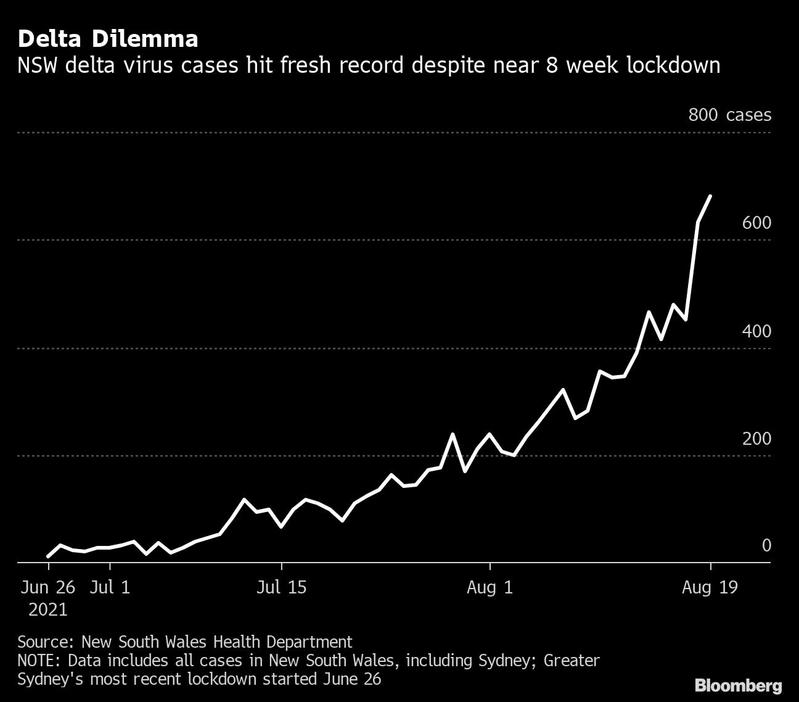
The number of cases in Australia’s two-most populous states surpasses the nation’s previous high, recorded in early August 2020, when Melbourne was in the midst of a lockdown that lasted for three months.
Authorities are now finding that lockdown strategies that had previously worked to eliminate community transmissions are struggling to contain the spread of the highly-contagious delta variant, especially as people grow increasingly weary of the stay-home restrictions.
Regional New South Wales will remain in lockdown until at least August 28, in line with Sydney, Berejiklian added.
ALSO READ: Australia: Entire state of NSW in lockdown virus cases jump
High vaccination uptake among Asian airlines' crew
Asian airlines are reporting high vaccination take-up rates among pilots and cabin crew as they wait for the region's tight pandemic-related border controls to be relaxed.
International travel in the Asia-Pacific region remains down about 95 percent from pre-pandemic levels, and concerns about the Delta variant have led to even stricter quarantines or flight caps in some places, leaving many air crew members idle and hoping for a recovery.
Singapore Airlines Ltd, Malaysia Airlines, Australia's Qantas Airways Ltd and Hong Kong's Cathay Pacific AirwaysLtd are among those requiring crew to be vaccinated or risk losing their jobs.
Singapore Airlines said that 99 percent of active pilots and cabin crew had been vaccinated ahead of a Sept 1 deadline, as well as all frontline ground staff. Malaysia Airlines said that all active pilots and cabin crew had received vaccines as had 95 percent of Malaysia-based employees under a policy set in July.
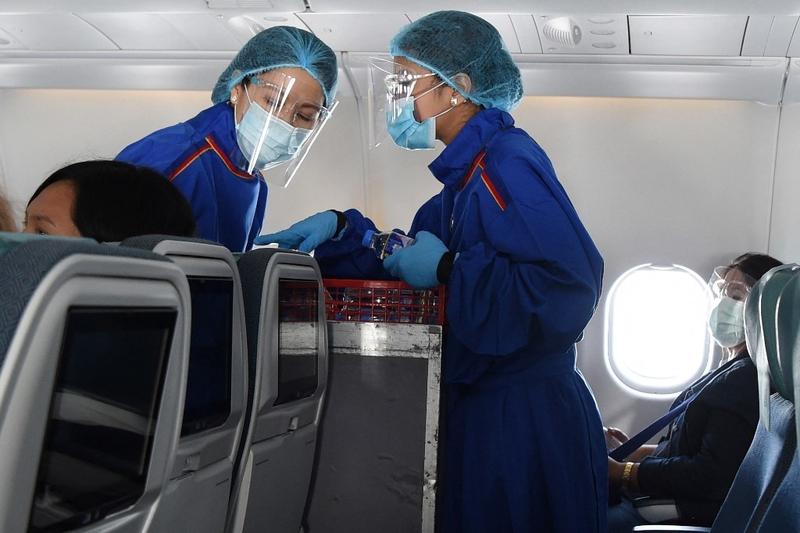 This photo taken on June 24, 2021 shows Philippine Airlines' (PAL) crew members wearing protective gear as a preventive measure against the coronavirus serving water after taking off from General Santos City airport, on the southern island of Mindanao. (TED ALJIBE / AFP)
This photo taken on June 24, 2021 shows Philippine Airlines' (PAL) crew members wearing protective gear as a preventive measure against the coronavirus serving water after taking off from General Santos City airport, on the southern island of Mindanao. (TED ALJIBE / AFP)
Qantas on Wednesday said all employees must be vaccinated, while Cathay has mandated it for pilots and cabin crew by Aug 31.
Qantas's Singapore-based budget offshoot Jetstar Asia said that all employees had to be vaccinated by Oct 1, and that nearly 100 percent had done so to date.
Even at airlines where crew vaccinations remain voluntary, carriers are reporting high take-up rates.
In the Philippines, budget carrier Cebu Pacific said 92 percent of its workforce, including 97 percent of pilots, were inoculated. AirAsia Philippines said 92 percent of its workers had received doses voluntarily, including 97 percent of cabin crew.
India
India reported on Thursday 36,401 new COVID-19 cases over the last 24 hours, the government said in a statement.
Iran
Iran reported on Wednesday 39,174 new COVID-19 cases, taking the country's total infections to 4,556,417.
The pandemic has claimed 99,691 lives in the country, after 583 new deaths were registered in the past 24 hours, according to a briefing published by Iran's Ministry of Health and Medical Education on its official website.
On Tuesday evening, Deputy Health Minister Iraj Harirchi said there were initial signs suggesting that the current surge in COVID-19 cases and deaths in Iran could have reached its peak, and the number of daily new cases might start to decline.
The infection and hospitalization rates are stable in 14 Iranian provinces and the spread of the epidemic is on the decline in these regions, the official noted.
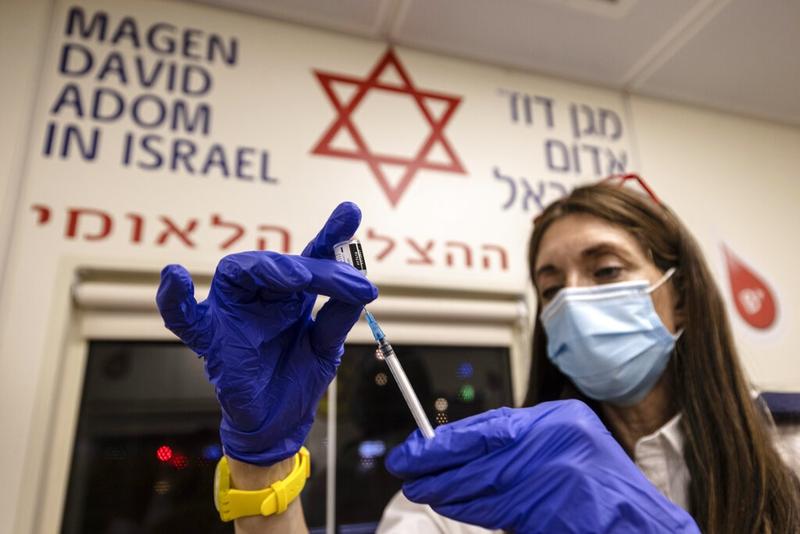 A medic from Israel's Magen David Adom emergency service prepares a booster shot of the coronavirus vaccine in Tel Aviv, Israel on Aug 14, 2021. (TSAFRIR ABAYOV / AP)
A medic from Israel's Magen David Adom emergency service prepares a booster shot of the coronavirus vaccine in Tel Aviv, Israel on Aug 14, 2021. (TSAFRIR ABAYOV / AP)
Israel
Israel expanded COVID-19 restrictions on Wednesday following the recent surge in new cases, the country's health ministry said.
The green pass, which represents a permit to enter indoor and crowded outdoor places for recovered and vaccinated people, was expanded to most sectors.
The green pass will now also include swimming pools, museums, libraries, national parks and nature reserves, while hotels, restaurants, cafes, gyms and culture events were already subject to the pass.
Children aged 3 to 12, who are not eligible to receive the vaccine, can take a free PCR test, valid for 72 hours, or a free rapid antigen test, valid for 24 hours.
Those aged above 12 who are not vaccinated or recovered will only be able to take the rapid test at their own expense.
Israel's Ministry of Health reported 7,870 new COVID-19 cases on Wednesday, bringing the tally of infections in the country to 962,193.
The death toll from the coronavirus rose by 24 to 6,723.
Laos
The ongoing lockdown in Laos will be extended for 15 more days till Sept. 2 as the COVID-19 cases continued to rise.
Deputy Head of the Prime Minister's Office Thipphakone Chanthavongsa told a press conference in Lao capital Vientiane on Thursday that the lockdown will be extended as imported COVID-19 cases continued to increase.
She said the lockdown extension also aimed to bring community transmissions of COVID-19 under control.
The National Taskforce Committee for COVID-19 Prevention and Control on Thursday reported 265 new imported cases and 19 locally transmitted cases.
Malaysia
Malaysia reported 22,948 new coronavirus cases on Thursday, a new daily record. The country has recorded nearly 1.49 million infections overall.
Mongolia
Mongolia confirmed 1,875 new COVID-19 cases in the last 24 hours, bringing the national tally to 188,407, the country's health ministry said Thursday.
Two more deaths were recorded, taking the total death toll to 891, it said.
Myanmar
The death toll of COVID-19 in Myanmar has risen to 13,786 after 163 new deaths were reported in the past 24 hours, according to a release from the Ministry of Health on Wednesday.
The country also reported 2,878 new COVID-19 positive cases, bringing the tally to 363,169 so far, according to the release.
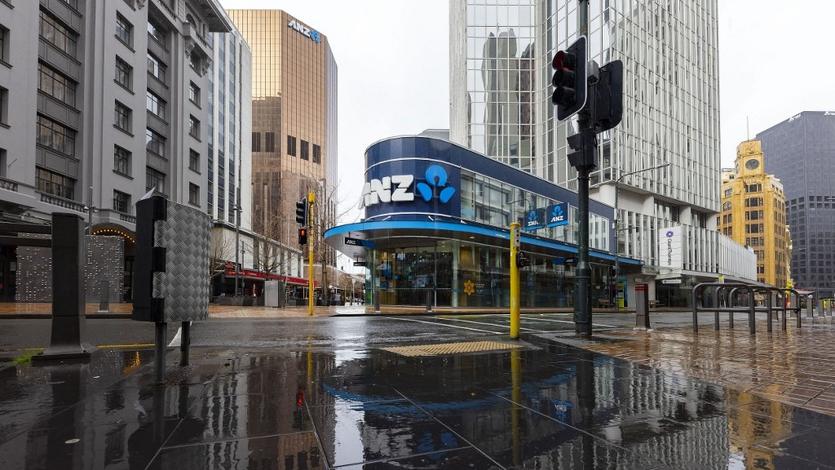 This picture shows empty streets during a nationwide COVID-19 lockdown in Wellington, New Zealand on Aug 18, 2021. (MARTY MELVILLE / AFP)
This picture shows empty streets during a nationwide COVID-19 lockdown in Wellington, New Zealand on Aug 18, 2021. (MARTY MELVILLE / AFP)
New Zealand
New Zealand's coronavirus cases jumped on Thursday, as questions grew about the government's response to the pandemic given the slowest vaccination rate among developed countries and the economic pressures of prolonged isolation.
Eleven new cases were reported on Thursday, taking the total to 21 in the latest outbreak that ended the country's six-month, virus-free run.
Prime Minister Jacinda Ardern said, however, that the virus has not been in the community for long as authorities had linked its origin to a recent returnee from Sydney on Aug 7.
"This is a significant development. It means now we can be fairly certain how and when the virus entered the country," Ardern said at a news conference.
"And the period in which cases were in the community were relatively short."
New Zealanders had been living without curbs until Ardern ordered a snap 3-day nationwide lockdown on Tuesday after a new case was found in the largest city Auckland, the first in the country since February.
Only about 23 percent of its 5 million people have been fully vaccinated so far, the lowest rate among the 38 members of the Organization for Economic Co-operation and Development (OECD).
"It's no longer clear Jacinda Ardern's strategy is the right one," read one opinion piece in the New Zealand Herald.
Others questioned the viability of Ardern's 'stamp it out' or 'zero COVID' strategy as the world grapples with the highly contagious Delta variant.
Opposition National Party leader Judith Collins labelled the vaccination rollout as a "failure", saying the country had no choice but to go into lockdown as most people were still exposed.
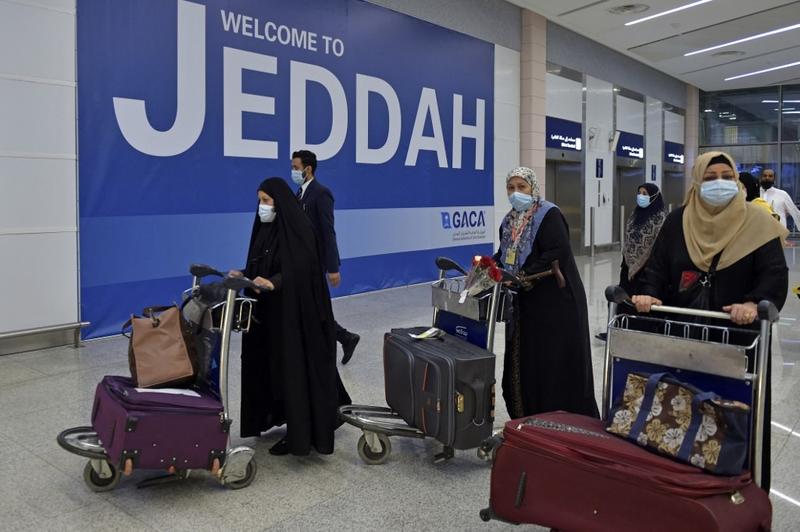 People wearing face masks arrive at King Abdulaziz International Airport in the Red Sea coastal city of Jeddah, Saudi Arabia on Aug 15, 2021. (AMER HILABI / AFP)
People wearing face masks arrive at King Abdulaziz International Airport in the Red Sea coastal city of Jeddah, Saudi Arabia on Aug 15, 2021. (AMER HILABI / AFP)
Saudi Arabia
Saudi Arabia signed on Wednesday an agreement with the International Air Transport Association (IATA) to facilitate the international use of its health passport issued for those vaccinated against COVID-19.
A joint operational protocol was signed to link the IATA Travel Pass app with the kingdom's Tawakkalna app, which was designed by the Saudi Authority for Data and Artificial Intelligence (SDAIA), the Saudi authority revealed in a statement.
Keeping the users updated with the COVID-19 situation in Saudi Arabia, Tawakkalna also shows digital immunization certificates.
The agreement aims to activate the use of the kingdom's app overseas, facilitate travel eligibility, and guarantee the global approval of the Saudi health passport.
ALSO READ: S. Korea adopts electronic travel authorization for foreign visitors
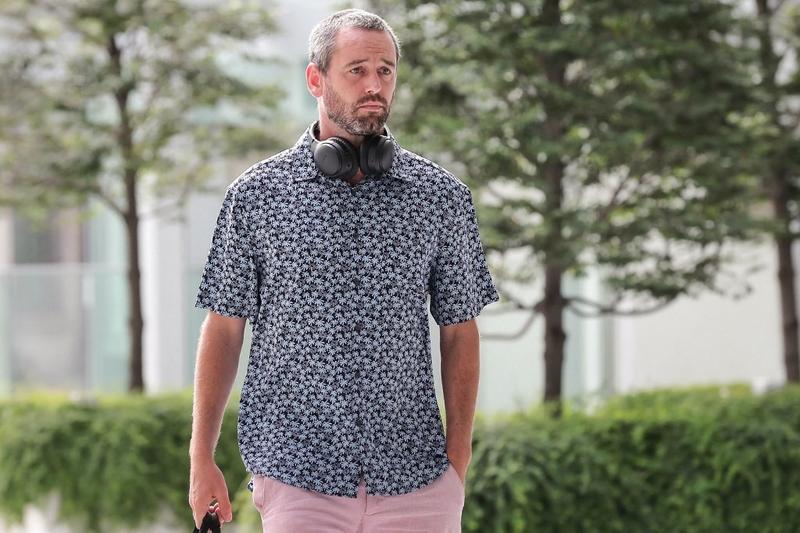 This picture provided by The Straits Times on Aug 19, 2021 and taken on July 2, 2021 shows British national Benjamin Glynn arriving at the Singapore State Courts in Singapore. Glynn was sentenced to six weeks' jail in Singapore for not wearing a mask and harassing police, officials confirmed on Aug 19. (GAVIN FOO / THE STRAITS TIMES / AFP)
This picture provided by The Straits Times on Aug 19, 2021 and taken on July 2, 2021 shows British national Benjamin Glynn arriving at the Singapore State Courts in Singapore. Glynn was sentenced to six weeks' jail in Singapore for not wearing a mask and harassing police, officials confirmed on Aug 19. (GAVIN FOO / THE STRAITS TIMES / AFP)
Singapore
Singapore will deport a UK national who repeatedly refused to wear a mask in defiance of the Asian city-state’s strict social distancing rules, CNA reported.
Photos of Benjamin Glynn not wearing a mask on a train in Singapore’s central business district went viral, and he was charged for that violation as well as subsequently showing up for a court appearance without a mask.
Singapore's Ministry of Health reported 53 new COVID-19 cases on Wednesday, bringing the total tally in the country to 66,334.
The new infections included 49 locally transmitted cases. As many as 23 are linked to previous cases and have already been placed on quarantine. Seven are linked to previous cases and were detected through surveillance, while 19 are currently unlinked.
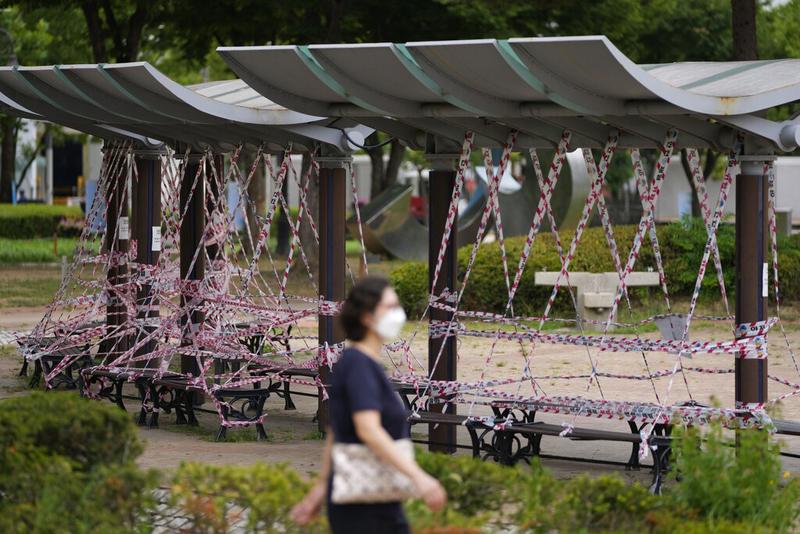 A visitor wearing a face mask walks near benches which are taped off for the social distancing measures and a precaution against the coronavirus at a park in Anyang, South Korea on Aug 13, 2021. (LEE JIN-MAN / AP)
A visitor wearing a face mask walks near benches which are taped off for the social distancing measures and a precaution against the coronavirus at a park in Anyang, South Korea on Aug 13, 2021. (LEE JIN-MAN / AP)
South Korea
South Korea reported more than 2,000 new coronavirus cases for the second time on Thursday as it struggles to subdue a wave of outbreaks during the summer holidays, driven by the more contagious Delta variant.
The Korea Disease Control and Prevention Agency (KDCA) reported 2,152 cases for Wednesday, the second highest since the pandemic began, after the daily tally topped 2,200 for the first time last week. Total infections rose to 230,808, with 2,191 deaths.
The latest infections emerged around the capital, Seoul, and neighbouring regions but have spread nationwide as people travel for vacations.
More than 35 percent of the 2,114 domestically transmitted cases were in areas outside the capital, up from some 20 percent a month ago, KDCA data showed.
The fourth COVID-19 wave has shown few signs of abating even after the toughest Level 4 distancing rules, which include a ban on gatherings of more than two people after 6 pm, in the greater Seoul area for six weeks.
Most other regions are under Level 3 curbs, which include a ban on gatherings of more than four people at any time and a 10 pm curfew for cafes and restaurants.
The government is expected to extend the curbs on Friday, possibly for the four weeks leading up to the Korean thanksgiving holiday of Chuseok next month, when normally tens of millions of people travel across the country.
A shortage of vaccines has meant only 21.1 percent of the 52 million population is fully vaccinated as of Wednesday, while about 47 percent have had at least one dose, according to the KDCA.
Thailand
Thailand on Thursday reported 301 new COVID-19 deaths, the second-highest daily death toll since the pandemic began, taking the total fatalities to 8,586, official data showed.
The Southeast Asian country reported 20,902 new infections, bringing the total caseload to 989,859, according to the Center for COVID-19 Situation Administration (CCSA).
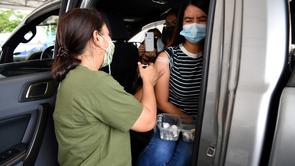 A health worker administers a dose of the BioNtech Pfizer COVID-19 vaccine to a resident at a drive-through vaccination center in Manila City suburban Manila on July 31, 2021. (PHOTO / AFP)
A health worker administers a dose of the BioNtech Pfizer COVID-19 vaccine to a resident at a drive-through vaccination center in Manila City suburban Manila on July 31, 2021. (PHOTO / AFP)
The Philppines
The Philippines is allotting 45.3 billion pesos (US$899 million) for COVID-19 booster shots under its 2022 budget, an official said, even as health authorities have yet to conclude there is a need for a third dose.
"We have a budget entry for a booster shot for all Filipinos," presidential spokesman Harry Roque told a regular news conference.
It is unclear how many doses of vaccine the budget can cover, but the Philippines has approved the emergency use of eight brands, including those of Pfizer and partner BioNTech and Moderna, which the United States will start offering as boosters in September.
The Philippines, which is battling one of the worst COVID-19 outbreaks in Asia, has fully vaccinated nearly 13 million people, or 11.7 percent of the total population of 110 million.
The Philippines' Department of Health reported 14,895 new COVID-19 infections on Thursday, the second-highest one-day tally since the outbreak began in January last year.
The caseload brings the total number of confirmed cases in the Southeast Asian country to 1,791,003.
The death toll climbed to 30,881 after 258 more patients died from the viral disease, the department added.


